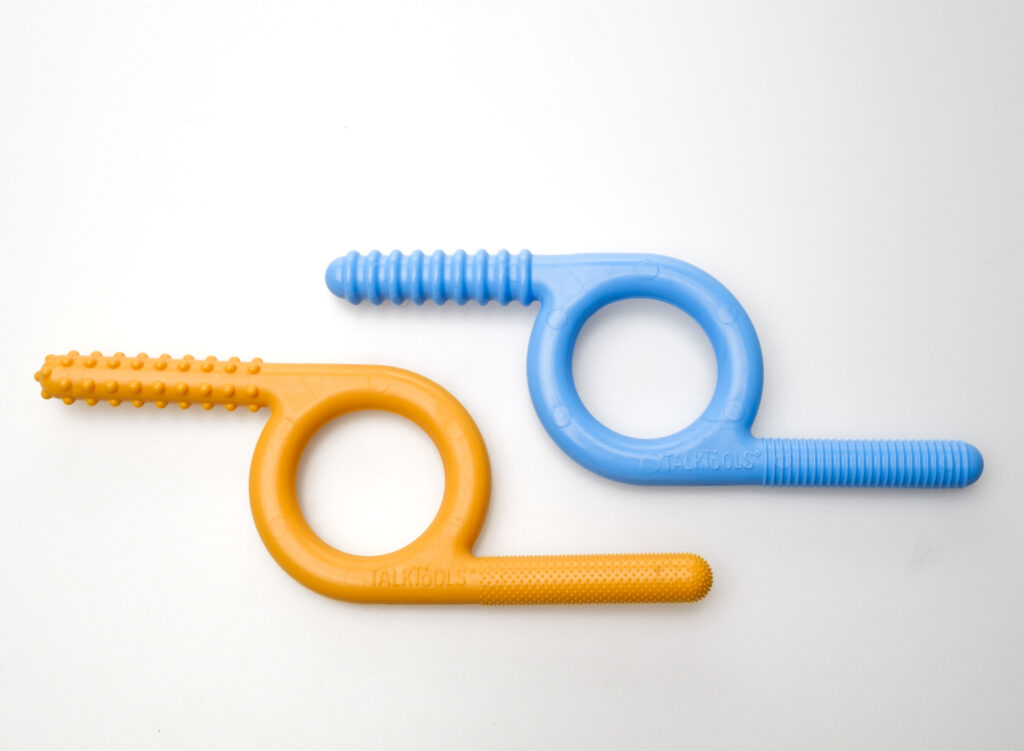
Table of Contents:
1. Introduction to TalkTools Textured Chewy
2. Why Oral Motor Sensory Tools Matter for Autism, ADHD, and Sensory Processing Disorder
3. Key Features of TalkTools Textured Chewy
4. Benefits for Speech Therapy and Oral Motor Development
5. Calming & Focusing Oral Seekers with TalkTools Chewy
6. How TalkTools Textured Chewy Enhances Chewing and Biting Skills
7. Why Parents and Therapists Recommend TalkTools Chewy
8. FAQ Section: Common Questions about TalkTools Textured Chewy
9. Conclusion: A Versatile Solution for Oral Sensory Input
1. Introduction to TalkTools Textured Chewy
For children with autism and ADHD, the TalkTools Textured Chewy is an essential oral sensory tool that provides safe, durable chewing alternatives. This product is designed to improve chewing, biting, and overall oral motor development, making it a trusted solution for therapists and parents alike. In this blog, we’ll explore the various benefits of the TalkTools Textured Chewy, how it helps in managing anxiety and sensory needs, and why it’s highly recommended for speech therapy and daily use.
2. Why Oral Motor Sensory Tools Matter for Autism, ADHD, and Sensory Processing Disorder
Children with autism, ADHD, and sensory processing disorder (SPD) often seek oral sensory input to self-regulate, stay calm, and focus better. This oral input helps reduce anxiety and satisfies the need for stimulation that some children exhibit through inappropriate chewing behaviors. Using a tool like the TalkTools Textured Chewy provides a safe, convenient alternative to chewing on clothes, pencils, or other non-safe items.
3. Key Features of TalkTools Textured Chewy
- Durable & Long-Lasting: The chewy is designed to withstand repetitive chewing, making it perfect for everyday use at home, school, or therapy.
- Therapist-Recommended: TalkTools is a trusted name in speech therapy, and their textured chewy is frequently recommended for children with oral motor challenges.
- Textured Design: The unique texture stimulates the oral sensory receptors, providing a more engaging experience for the user.
- Safe Material: Made from non-toxic materials, the TalkTools Chewy is a safe solution for all ages.
- 2-Pack Convenience: With two chewies in a pack, one can be used at home and the other for on-the-go activities or therapy sessions.
4. Benefits for Speech Therapy and Oral Motor Development
Oral motor development is essential for effective speech and proper eating habits. The TalkTools Textured Chewy can help improve oral strength, coordination, and sensory awareness, all of which play a role in speech production. Children who face challenges with speech due to poor oral motor skills can benefit from regularly using this chew tool, as it builds the necessary muscles and reflexes needed for clearer speech.
5. Calming & Focusing Oral Seekers with TalkTools Chewy
Children with autism, ADHD, or SPD often struggle to focus due to their constant need for sensory input. The TalkTools Textured Chewy serves as a calming aid by providing consistent oral stimulation, which can help reduce anxiety and promote better focus. Whether at school, home, or in therapy, the chewy can be a go-to tool for children needing extra support to self-regulate.
6. How TalkTools Textured Chewy Enhances Chewing and Biting Skills
Many children with oral motor issues struggle with chewing and biting, leading to difficulties with eating a variety of foods. The textured design of the TalkTools Chewy mimics the sensations of eating textured foods, helping children develop stronger chewing patterns. Over time, this can lead to improved eating habits, greater food variety acceptance, and enhanced oral motor skills.
7. Why Parents and Therapists Recommend TalkTools Chewy
Effective for Oral Sensory Seekers: Parents and therapists frequently recommend the TalkTools Textured Chewy because it offers a safe, durable solution for kids who need oral sensory input. Versatile Use: The chewy can be used in various settings—whether at home, in therapy, or while traveling, ensuring children get the oral stimulation they need to focus and remain calm. Therapy-Approved: As part of a broader oral motor therapy program, the chewy is trusted by speech and occupational therapists worldwide.
8. FAQ Section: Common Questions about TalkTools Textured Chewy
Q1: How can the TalkTools Textured Chewy help with speech development?
A1: The chewy strengthens the oral muscles required for speech production. It can be part of speech therapy routines to improve chewing, biting, and tongue control.
Q2: Is the TalkTools Textured Chewy safe for toddlers?
A2: Yes, the chewy is made from non-toxic materials and is designed for children, toddlers, and adults alike. Supervision is recommended for younger children.
Q3: Can this chewy be used for anxiety management in children with autism or ADHD?
A3: Absolutely. Oral sensory input from the TalkTools Chewy helps many children self-regulate and reduce anxiety, making it a calming tool for oral sensory seekers.
Q4: How often should my child use the chewy?
A4: This depends on the child’s needs. Some children benefit from using it throughout the day, while others may only need it during periods of high anxiety or when focusing is difficult.
Q5: Is the TalkTools Textured Chewy dishwasher-safe?
A5: While it’s recommended to clean the chewy regularly, always check the manufacturer’s instructions for proper care and cleaning.
9. Conclusion: A Versatile Solution for Oral Sensory Input
The TalkTools Textured Chewy is an invaluable tool for children with autism, ADHD, and sensory processing disorder. By offering oral sensory input that helps calm, focus, and improve oral motor skills, it supports both children and their caregivers in managing daily challenges. Whether used in therapy or at home, the chewy provides a safe, therapist-approved solution that promotes well-being and development in children who seek oral sensory stimulation.